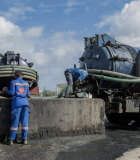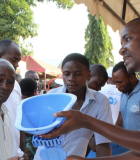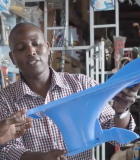Ghana is a country of jarring contradictions. Technology is quickly infiltrating daily lives: nearly everyone has a mobile phone, the majority have access to electricity, and millions use the internet. But less than 15 percent of the country has access to basic sanitation, and one in five Ghanaians defecate in the open.
Anani Abeena from Taviefe-Dzefe village in the Volta Region says this is because the latrines available in rural villages like his are just not appealing. Abeena, a 54-year-old farmer and father of five, said household latrines are too expensive, difficult to maintain, and unpleasant to use. “There are a few household latrines around, but considering the bad odor and the number of flies that hover around them, that did not encourage me to get one,” he said. So, for most of his life, he opted to relieve himself in the bush.
Abeena is not alone: more than 800 million people worldwide still defecate in the open. This has resulted in billions of lost dollars from the global economy due to diarrheal illness and widespread threats to public health, including a heightened risk of global epidemics.
Click here to read the full article in USAID's Global Waters magazine.






